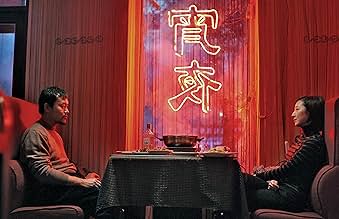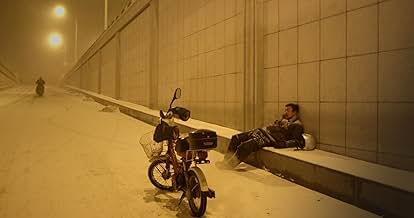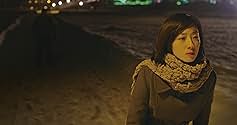CALIFICACIÓN DE IMDb
6.7/10
10 k
TU CALIFICACIÓN
Un expolicía y su antiguo compañero deciden seguir investigando una serie de asesinatos que acabó con sus carreras de forma humillante cuando descubren que estos vuelven a producirse.Un expolicía y su antiguo compañero deciden seguir investigando una serie de asesinatos que acabó con sus carreras de forma humillante cuando descubren que estos vuelven a producirse.Un expolicía y su antiguo compañero deciden seguir investigando una serie de asesinatos que acabó con sus carreras de forma humillante cuando descubren que estos vuelven a producirse.
- Dirección
- Guionista
- Elenco
- Premios
- 28 premios ganados y 46 nominaciones en total
- Dirección
- Guionista
- Todo el elenco y el equipo
- Producción, taquilla y más en IMDbPro
Opiniones destacadas
Black Coal, Thin Ice is the kind of film that can only be felt, the charming point of the film is the indescribable feeling you get from the unique atmosphere. It's a suspense film with sort of Film-Noir feeling, but the plot of the case actually is not so important. As I said, what matters is the feeling. Those empty street shots, environment background sounds, strange acts and even some dark humor tastes. It even looks like a Jia Zhangke's film sometimes.(Well, Jia Zhangke's name did appear in the thank list in the end credits.) Such feeling reached the top in the ending of the pyrotechnical in daytime, it not only reflect the title (The Chinese title is Bai ri yan huo, which means The Daylight Pyrotechnix.) but also release the depressed emotion and atmosphere. (The Uncut Version has very strange but interesting dark humor style scenes in the ending, but they are cut out in the Censored Mainland China Theatrical Version.)
The atmosphere in the film is nearly perfect, however the romance relationship between two characters is not believable at all. The whole film is based on that relationship, but it didn't convince me. Without the reliable relationship, the rest of the film seems not make sense at all. So yeah, it's a rare and unique film in Chinese cinema, it is well did in many aspects, but I don't think it is qualified for Golden Berlin Bear.
My score: 7.5 for the Uncut Version, 7.3 for the Mainland China Censored Theatrical Version.
The atmosphere in the film is nearly perfect, however the romance relationship between two characters is not believable at all. The whole film is based on that relationship, but it didn't convince me. Without the reliable relationship, the rest of the film seems not make sense at all. So yeah, it's a rare and unique film in Chinese cinema, it is well did in many aspects, but I don't think it is qualified for Golden Berlin Bear.
My score: 7.5 for the Uncut Version, 7.3 for the Mainland China Censored Theatrical Version.
There are definitely some impressive technical flourishes here. The lighting and the colors used are gorgeous, and really do highlight a lot of the film's atmosphere, which is the other good thing about it. It's able to achieve atmosphere in a rather surprising way, but it's just too bad hat that atmosphere is wasted and doesn't really highlight much. The acting is decent, but the story and the screenplay leave a lot to be desired. The characters just aren't developed all that well, and just are so, so dull. The film's sense of pacing and development are non- existent. I don't think this is anything worthwhile, although I'm sure many will like it just fine.
The plot is that two cops who have had their careers ruined, by a case that went horribly wrong, decide to reunite. This they do after a murder that has striking similarities to the one that floored them happens again.
Zhang Zili has lost everything, his wife, the job he loved and has turned to the bottle as he goes through the motions as an underpaid security guard. Then he gets the chance to solve the case that is his nemesis. This is not a police procedural though; this has elements of the heart, base existentialism and even dark humour.
This is from director and writer Yi'nan Diao who brought us 'Night Train' and 'Uniform'. He comes from a very industrialised part of China and this is generally reflected in his films - and indeed it is here. Also the loneliness that comes from the isolating capacity of industrialised living. This though is a confident and assured piece of film making. Even when I thought a scene or two had stayed going a tad too long, he just reveals why and all of a sudden you are right back on track. In Mandarin and running to around 100 minutes this will appeal to those who appreciate modern Chinese cinema and who like a bit of dark brooding to their crime thrillers.
Zhang Zili has lost everything, his wife, the job he loved and has turned to the bottle as he goes through the motions as an underpaid security guard. Then he gets the chance to solve the case that is his nemesis. This is not a police procedural though; this has elements of the heart, base existentialism and even dark humour.
This is from director and writer Yi'nan Diao who brought us 'Night Train' and 'Uniform'. He comes from a very industrialised part of China and this is generally reflected in his films - and indeed it is here. Also the loneliness that comes from the isolating capacity of industrialised living. This though is a confident and assured piece of film making. Even when I thought a scene or two had stayed going a tad too long, he just reveals why and all of a sudden you are right back on track. In Mandarin and running to around 100 minutes this will appeal to those who appreciate modern Chinese cinema and who like a bit of dark brooding to their crime thrillers.
How does a Chinese director empty the noir sensibility of any and all of the glamour associated with its Hollywood counterpart? How does it become a study in pure dourness and grimness? If you're Yi'nan Diao, the first thing you do is set it in a place as grim and dour as a northern Chinese factory town circa 1999. In this frozen wasteland that may or may not be Harbin – it doesn't matter, it could be Siberia – the ball gets rolling when dead body parts start showing up on the conveyor belt of a coal processing plant: after all, in this time and space in China, the human body is just another physical commodity
Following a bloody shootout that leaves the two main suspects and two of his partners dead, we jump forward five years to find the surviving detective, Zhang Zili, paralyzed by the trauma, retired from the police force and passed out in the snow in an alcoholic stupor. But things are never what they seem in noir, right? So he's dragged back into the case when a former partner of his suspects the involvement of a black widow- like female at the heart of the matter. An exotic call girl? A mysterious nightclub singer? No – just some depressed woman who works at a dry cleaner's where she's regularly mauled by her piggish oaf of a boss.
The plot is unimportant, really, because the film is one big painting, a night-time world where the neon signs of the internet gambling dens and bleak taxi-dancing joints are beaten into submission by the cold dark chill of northern China, where all color and light are sucked into the film's essence, which is nothing but a black hole, a gravitational death machine that swallows up every photon in sight. At one point, while spinning around the world's most depressing ice skating rink, Zili asks his former partner, "Does anybody ever really win at life?" Of course not. Like all the other catatonic ice skaters, he's just going round and round, sometimes ahead, sometimes behind (depending on one's point of view ) getting nowhere while people continue to copulate and kill and die. The key to the film is the direct translation of the Chinese title, which means "daytime fireworks." I'll let you figure that out for yourself, but if you like your noir pitch-black, this one's for you.
Following a bloody shootout that leaves the two main suspects and two of his partners dead, we jump forward five years to find the surviving detective, Zhang Zili, paralyzed by the trauma, retired from the police force and passed out in the snow in an alcoholic stupor. But things are never what they seem in noir, right? So he's dragged back into the case when a former partner of his suspects the involvement of a black widow- like female at the heart of the matter. An exotic call girl? A mysterious nightclub singer? No – just some depressed woman who works at a dry cleaner's where she's regularly mauled by her piggish oaf of a boss.
The plot is unimportant, really, because the film is one big painting, a night-time world where the neon signs of the internet gambling dens and bleak taxi-dancing joints are beaten into submission by the cold dark chill of northern China, where all color and light are sucked into the film's essence, which is nothing but a black hole, a gravitational death machine that swallows up every photon in sight. At one point, while spinning around the world's most depressing ice skating rink, Zili asks his former partner, "Does anybody ever really win at life?" Of course not. Like all the other catatonic ice skaters, he's just going round and round, sometimes ahead, sometimes behind (depending on one's point of view ) getting nowhere while people continue to copulate and kill and die. The key to the film is the direct translation of the Chinese title, which means "daytime fireworks." I'll let you figure that out for yourself, but if you like your noir pitch-black, this one's for you.
This 2014 Golden Berlin Bear winner (with a rare second Silver Berlin Bear award of BEST ACTOR for Fan Liao) is Chinese director Yi'nan Diao's third feature, and his first to be shown in cinemas and harvested over one hundred million RMB, roughly equivalent to 16 million dollars, thanks to the international accolades it received. Its original title can be translated verbatim as "White Day Fireworks", it is the name of a nightclub which would be revealed as a crucial thread to a murder case, furthermore Diao arranges a literal daytime firework show to climax the film in the coda, meanwhile, its official English title: Black Coal, Thin Ice, betrays the locations which relation all the murder cases during a five-year span.
The film starts in 1999, in an unspecified city in China's North-east province Heilongjiang, Zhang (Liao) is a recently-divorced policeman, during a fresh case of a dismembered body scattered in sundry collieries where an I.D. card indicates the dead is Liang (Xuebing Wang), but due to his negligence, two fellow policemen are killed in operation while Zhang is also wounded. After that, the time jumps to 2004, now Zhang is a life-beaten drunkard and works as a security guard, two new dismembered bodies have been found, all link back to Liang's wife Wu (Gwei), whose mysterious mien attracts Zhang, he embarks on a personal investigation to follow her, strike up a conversation with her in the dry-cleaner where she works, and eventually ask her out for an ice-skating date. But at the same time, danger is lurking around him too, is Liang really dead? Or is Wu as innocent as she looks? Can all the mysteries be brought into daylight in the end or is there another lie involved? Diao smugly leaves an semi-opening end with many spurious clues (e.g. the cremains Wu buried under the tree Vs. her apparent lie of discarding it over the sea during the inquiry), to prompt viewers for disparate interpretations.
This film is to a great extent inscribed as an art-house fare with its lurid background or foreground colour embedding in almost every scene, the visual palette is meticulously chosen and also overtly, Diao is a faithful apprentice of symbolism, from a battered ladybug on the bedsheets in the opening sequence, to an abrupt introduction of a deserted horse left by junkmen, until the firework finale reaches the hallmarks of its veiled fatalism pretentiousness buried in his not-so-justifiable script, there must be a more plausible reason behind a redemption by right of admitting a murder one might not execute, it unfortunately gives an impression of a desperate trick to glaze over the banality of the story, to romanticize the damsel-in-distress reverie.
The whole story is a dancing-on-the-edge between a sex-driven anti-hero and a irresolute femme fatale, with a jarring red herring which leads to nowhere. But the two leads are giving fantastic performances, Fan Liao breathes out the irascible mentality stinkingly inflicted on a non-starter who clings to the last straw and strives to feel the ardor of living again. While Lun Mei Gwei from Taiwan, may seem to be an odd choice for a North-east girl, heedfully, she doesn't have many lines to give away her southern accent, instead, relies on her body language and facial expressions, her air of mystique is the most enticing feature entraps audience even in the film's banalest moment.
Winning over the likes of BOYHOOD (2014, 8/10) and THE GRAND BUDAPEST HOTEL (2014, 8/10) in Berlin inevitably becomes an over-achievement for this intense crime-thriller, but put it among its Chinese peers of the same year, the film can excel most of them hands down, as one of the must-see from the over-ballooning market where ingrainedly burdened with shoddy soil damages its own commodities.
The film starts in 1999, in an unspecified city in China's North-east province Heilongjiang, Zhang (Liao) is a recently-divorced policeman, during a fresh case of a dismembered body scattered in sundry collieries where an I.D. card indicates the dead is Liang (Xuebing Wang), but due to his negligence, two fellow policemen are killed in operation while Zhang is also wounded. After that, the time jumps to 2004, now Zhang is a life-beaten drunkard and works as a security guard, two new dismembered bodies have been found, all link back to Liang's wife Wu (Gwei), whose mysterious mien attracts Zhang, he embarks on a personal investigation to follow her, strike up a conversation with her in the dry-cleaner where she works, and eventually ask her out for an ice-skating date. But at the same time, danger is lurking around him too, is Liang really dead? Or is Wu as innocent as she looks? Can all the mysteries be brought into daylight in the end or is there another lie involved? Diao smugly leaves an semi-opening end with many spurious clues (e.g. the cremains Wu buried under the tree Vs. her apparent lie of discarding it over the sea during the inquiry), to prompt viewers for disparate interpretations.
This film is to a great extent inscribed as an art-house fare with its lurid background or foreground colour embedding in almost every scene, the visual palette is meticulously chosen and also overtly, Diao is a faithful apprentice of symbolism, from a battered ladybug on the bedsheets in the opening sequence, to an abrupt introduction of a deserted horse left by junkmen, until the firework finale reaches the hallmarks of its veiled fatalism pretentiousness buried in his not-so-justifiable script, there must be a more plausible reason behind a redemption by right of admitting a murder one might not execute, it unfortunately gives an impression of a desperate trick to glaze over the banality of the story, to romanticize the damsel-in-distress reverie.
The whole story is a dancing-on-the-edge between a sex-driven anti-hero and a irresolute femme fatale, with a jarring red herring which leads to nowhere. But the two leads are giving fantastic performances, Fan Liao breathes out the irascible mentality stinkingly inflicted on a non-starter who clings to the last straw and strives to feel the ardor of living again. While Lun Mei Gwei from Taiwan, may seem to be an odd choice for a North-east girl, heedfully, she doesn't have many lines to give away her southern accent, instead, relies on her body language and facial expressions, her air of mystique is the most enticing feature entraps audience even in the film's banalest moment.
Winning over the likes of BOYHOOD (2014, 8/10) and THE GRAND BUDAPEST HOTEL (2014, 8/10) in Berlin inevitably becomes an over-achievement for this intense crime-thriller, but put it among its Chinese peers of the same year, the film can excel most of them hands down, as one of the must-see from the over-ballooning market where ingrainedly burdened with shoddy soil damages its own commodities.
¿Sabías que…?
- TriviaThe literal translation of the Chinese title is 'Daylight Fireworks'. This is the name of the nightclub where Zhang learns a major lead, and is also echoed in the last scene.
- ConexionesReferences Xia nu Shisan Mei (1986)
Selecciones populares
Inicia sesión para calificar y agrega a la lista de videos para obtener recomendaciones personalizadas
- How long is Black Coal, Thin Ice?Con tecnología de Alexa
Detalles
- Fecha de lanzamiento
- Países de origen
- Sitio oficial
- Idioma
- También se conoce como
- Black Coal, Thin Ice
- Locaciones de filmación
- Productoras
- Ver más créditos de la compañía en IMDbPro
Taquilla
- Total a nivel mundial
- USD 16,830,885
- Tiempo de ejecución1 hora 50 minutos
- Color
- Relación de aspecto
- 1.85 : 1
Contribuir a esta página
Sugiere una edición o agrega el contenido que falta

Principales brechas de datos
By what name was Tan negro como el carbón (2014) officially released in Canada in French?
Responda






















